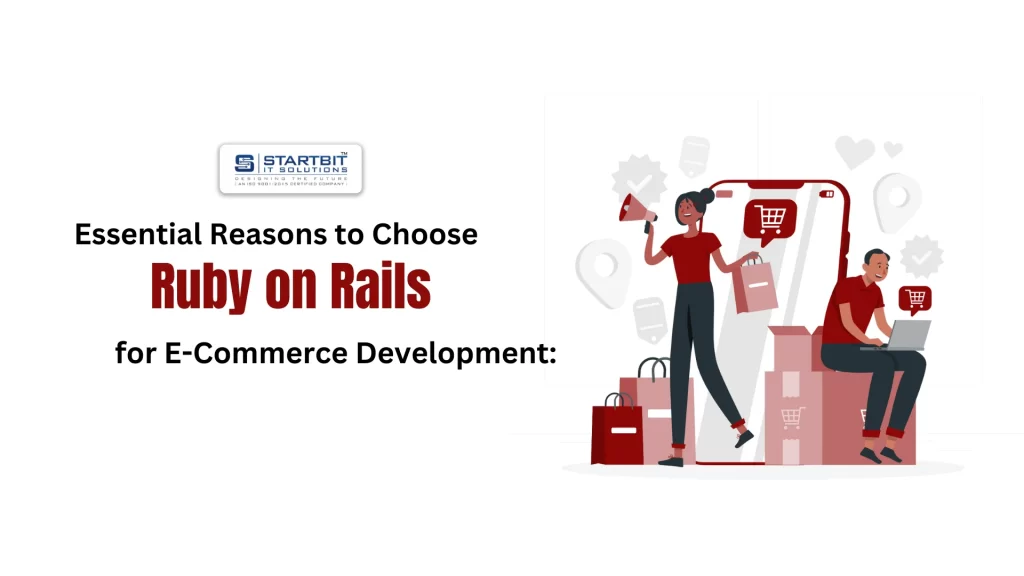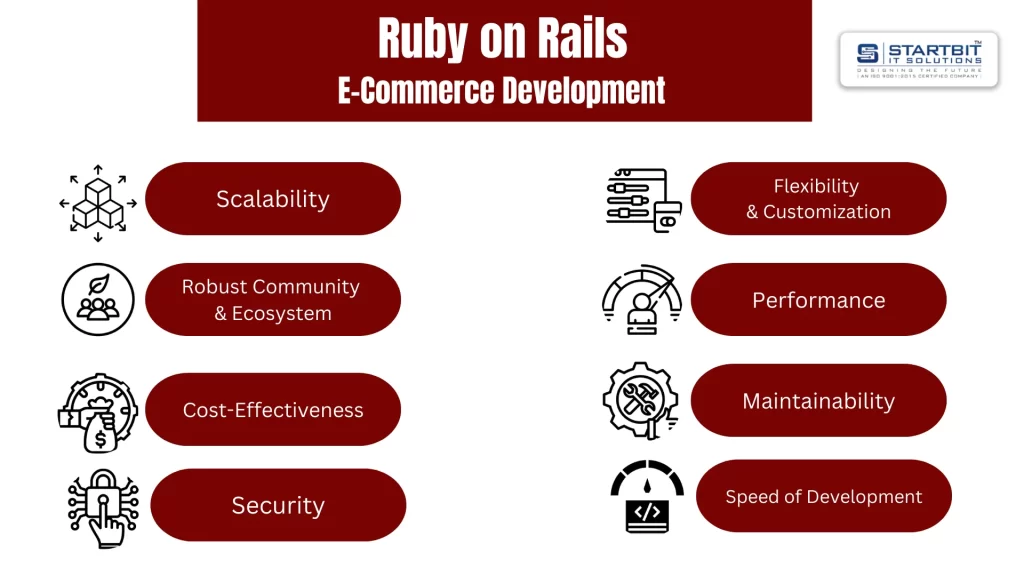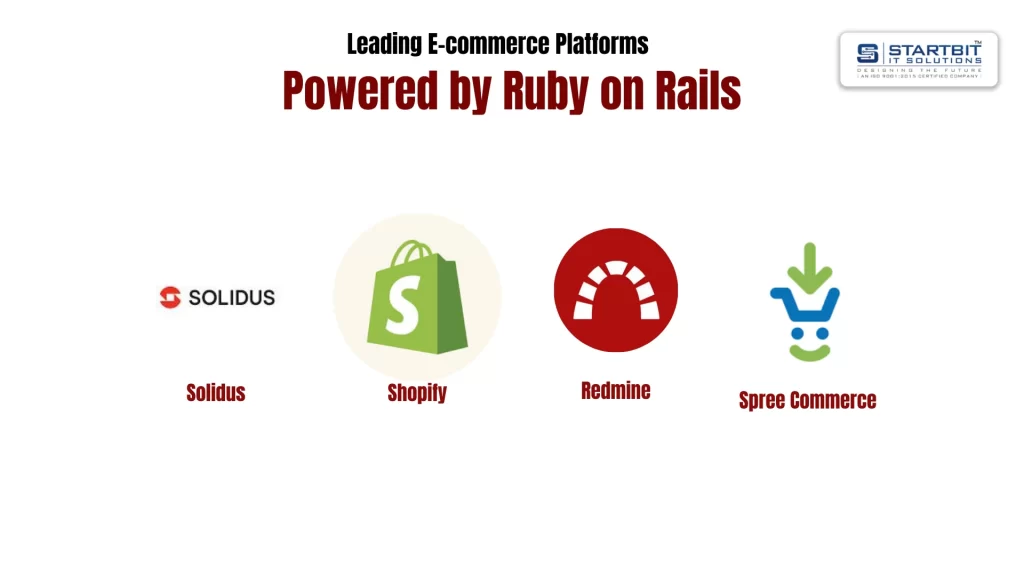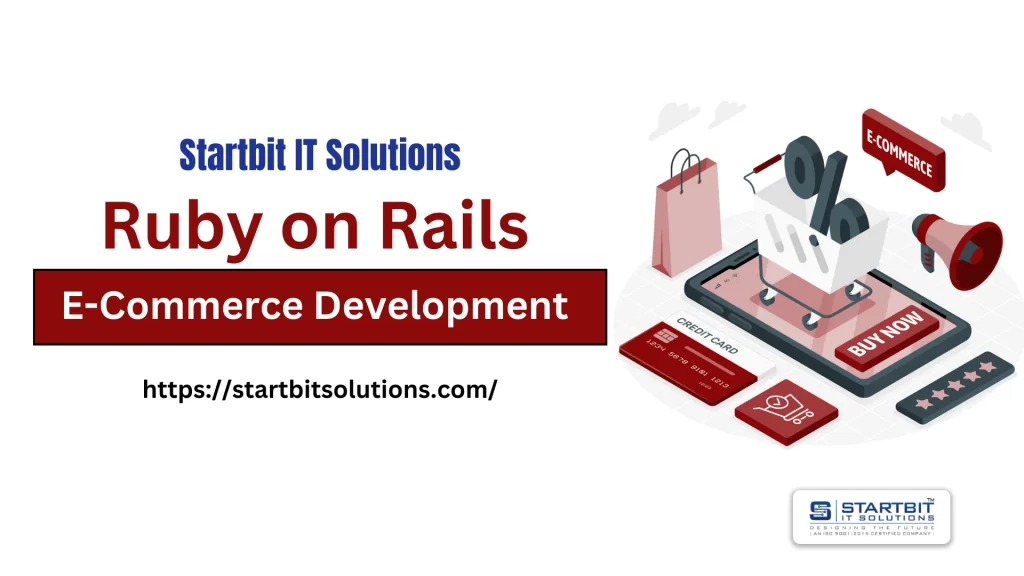Ruby on Rails stands out for its ability to empower businesses in the eCommerce sector, enabling them to create scalable, feature-rich online stores. The framework’s flexibility and robust architecture make it an ideal choice for developers looking to build dynamic and efficient web applications. By leveraging the power of the Ruby programming language, Ruby on Rails facilitates the development of eCommerce platforms that can grow alongside businesses, offering a seamless user experience and comprehensive functionality.

This rise in popularity underscores Ruby on Rails’ capability to meet the diverse needs of modern web development, particularly in creating robust eCommerce solutions that support business growth and innovation.
Why Use Ruby on Rails E-Commerce Development ?
Speed of Development:
One of the primary reasons developers prefer Ruby on Rails is its rapid development capabilities. RoR follows the convention over configuration (CoC) philosophy, which means that it comes with a set of conventions that simplify and speed up the development process. This allows developers to focus on the core functionalities rather than spending time on configuration files. The framework also supports agile development methodologies, making it easier to implement changes quickly and efficiently.
Scalability:
E-commerce platforms need to handle varying levels of traffic, especially during peak times like holidays or sales events. Ruby on Rails is highly scalable, allowing your application to grow with your business. With features like caching, load balancing, and database optimization, RoR can efficiently manage high traffic and large volumes of transactions without compromising performance.
Security:
Security is a paramount concern for any e-commerce platform, dealing with sensitive customer information and financial transactions. Ruby on Rails comes with built-in security features that protect against common vulnerabilities such as SQL injection, cross-site scripting (XSS), and cross-site request forgery (CSRF). The framework is regularly updated to address new security threats, ensuring that your e-commerce site remains secure.

Robust Community and Ecosystem:
Ruby on Rails boasts a large and active community of developers who contribute to its continuous improvement. This community support translates into a wealth of resources, including libraries (gems), plugins, and tutorials that can help streamline development. The extensive collection of gems available for RoR can add functionality ranging from payment processing to SEO optimization, reducing the time and effort needed to develop these features from scratch.
Cost-Effectiveness:
Given its efficiency in speeding up the development process, Ruby on Rails can significantly reduce development costs. The framework’s emphasis on convention over configuration minimizes the need for extensive coding, which translates to fewer hours spent on development. Additionally, the availability of open-source gems and plugins means that developers can leverage existing solutions rather than building custom ones, further cutting down costs.
Performance:
E-commerce platforms must offer fast loading times and seamless user experiences to prevent cart abandonment and ensure customer satisfaction. Ruby on Rails is designed to deliver high performance, with features like page caching, fragment caching, and support for background jobs. These capabilities help create a smooth and responsive user experience, which is essential for any successful e-commerce site.
Flexibility and Customization:
Every e-commerce business has unique requirements, and Ruby on Rails offers the flexibility needed to customize and tailor your platform to meet specific needs. Whether you need to integrate with third-party services, develop custom features, or create a unique user interface, RoR provides the tools and flexibility to make it happen.
Maintainability:
As your e-commerce platform evolves, maintaining clean and organized code becomes crucial. Ruby on Rails promotes good coding practices and modular design, making the codebase easier to manage and maintain. This ensures that new features can be added, and bugs can be fixed without compromising the overall stability and performance of the platform.
Key Features for Your Ruby on Rails E-commerce Project :
- Robust Authentication and Authorization: Ensure secure user authentication using gems like Devise or implementing OAuth for social logins. Implement role-based access control (RBAC) to manage permissions for administrators, ensuring only authorized users can access sensitive features and data.
- Flexible Product Management: Develop a comprehensive product management system allowing administrators to easily add, edit, and delete products. Include features for managing inventory levels, product variants (sizes, colors), categories, and pricing, ensuring flexibility to accommodate diverse product offerings.
- Smooth Payment Processing: Integrate reliable payment gateways such as Stripe, PayPal, or Braintree to facilitate seamless and secure transactions. Support multiple currencies and payment methods (credit/debit cards, digital wallets) to cater to global customers and enhance conversion rates.
- Scalable Order Management: Implement efficient order processing functionalities to handle high volumes of orders. Include features for order tracking, status updates, and automated notifications to keep customers informed about their order status in real-time.
- Responsive Design and UX: Design responsive and user-friendly interfaces that provide consistent experiences across devices (desktops, tablets, mobile phones). Focus on intuitive navigation, clear product presentation, and streamlined checkout processes to optimize conversion rates and enhance user satisfaction.
- Search and Filtering Options: Implement robust search functionality using tools like Elasticsearch or integrating with search-as-you-type APIs. Include filters (by price range, category, brand) to help users quickly find products matching their preferences, improving usability and reducing bounce rates.
- Customer Reviews and Ratings: Enable customers to leave reviews and ratings for products they have purchased. Display ratings prominently on product pages to build trust and provide social proof, helping potential buyers make informed decisions.
- Analytics and Reporting: Integrate analytics tools like Google Analytics or custom dashboards to track key metrics such as sales performance, traffic sources, and customer behavior. Generate reports to gain insights into user engagement, product popularity, and marketing campaign effectiveness, guiding strategic decisions.
- Security and Compliance: Ensure compliance with data protection regulations (e.g., GDPR, CCPA) by implementing measures such as HTTPS encryption, secure authentication, and data anonymization. Use PCI-DSS compliant payment gateways to protect sensitive customer payment information and build trust with users.
- Integration Capabilities: Support integration with third-party services (e.g., shipping carriers like FedEx or UPS, CRM systems like Salesforce) through APIs. Enable seamless data exchange and automation of processes such as order fulfillment, inventory management, and customer relationship management (CRM), enhancing operational efficiency and customer satisfaction.
Leading E-commerce Platforms Powered by Ruby on Rails
Ruby on Rails is a popular framework for building web applications, including e-commerce platforms. Here are some leading e-commerce platforms that are powered by Ruby on Rails:
Spree Commerce:
This is an open-source e-commerce platform that is built using Ruby on Rails. It’s known for its modular architecture, which allows developers to customize and extend its functionalities based on specific business needs. Spree Commerce is widely used for building online stores and offers a range of features suitable for different types of e-commerce businesses.
Shopify:
While Shopify is not exclusively built on Ruby on Rails, it has historically used Ruby on Rails for parts of its infrastructure. Shopify is a popular hosted e-commerce platform that provides merchants with everything they need to create and manage their online stores. It’s known for its ease of use and extensive ecosystem of apps and integrations.

Redmine:
Originally designed as a project management and issue tracking tool, Redmine is also used for managing small-scale e-commerce operations. It supports plugins that can extend its functionality to include basic e-commerce features, making it suitable for smaller online retail setups or internal business use.
Solidus:
Another open-source e-commerce platform built on Ruby on Rails, Solidus is designed for developers who prefer flexibility and customization options. It provides a foundation for building bespoke online stores and supports a wide range of e-commerce functionalities out of the box.
Challenges in Ruby on Rails for E-commerce Development:
Scalability: As e-commerce applications grow, handling large volumes of traffic, transactions, and data becomes crucial. RoR applications need careful architecture planning to ensure scalability, including efficient database design, caching strategies, and background job processing.
Performance: Ensuring fast response times and smooth user experience is critical in e-commerce. RoR applications may face performance bottlenecks due to inefficient code, database queries, or inadequate server resources. Techniques like query optimization, caching (e.g., using Redis), and using background processing (e.g., with Sidekiq) can help improve performance.
Security: E-commerce applications store sensitive customer information (like payment details), making security a top priority. RoR developers must implement secure coding practices, use strong authentication mechanisms (like Devise), handle input validation rigorously, and stay updated with RoR security patches.
Payment Gateway Integration: Integrating with payment gateways (like Stripe, PayPal) requires robust handling of transactions, handling different currencies, and ensuring compliance with PCI DSS standards. RoR’s gems and libraries can facilitate integration but require careful configuration and testing.
SEO and Marketing: E-commerce sites rely heavily on SEO to attract organic traffic. RoR developers need to ensure that the site generates SEO-friendly URLs, provides meta tags, and handles canonical URLs correctly. Integrating with marketing tools (like Google Analytics) and SEO plugins (like meta-tags gem) can help in optimizing the site.
Inventory Management and Order Processing: Handling real-time inventory updates, order processing, shipping integrations, and handling returns is complex. RoR developers need to design efficient workflows, integrate with logistics APIs (like FedEx, UPS), and ensure smooth communication between different parts of the system (orders, payments, inventory).
Responsive Design and UX: E-commerce sites must provide a seamless experience across devices. RoR developers often use front-end frameworks (like Bootstrap or Tailwind CSS) and ensure responsive design principles to optimize usability and conversion rates.
Maintenance and Upgrades: RoR frameworks and libraries receive updates regularly. E-commerce applications must be maintained to stay secure and compatible with newer RoR versions. This requires ongoing monitoring, testing, and updating dependencies.
Technical Stack Essentials for Ruby on Rails E-commerce :
Building an e-commerce application using Ruby on Rails involves choosing the right technical stack to ensure performance, scalability, and security. Here are some essential components and technologies typically used in a Ruby on Rails e-commerce setup:
Ruby on Rails Framework: The core framework for building the web application.
Database: Use PostgreSQL or MySQL as the database management system. PostgreSQL is often preferred for its robust features and scalability.
Frontend Framework: Options include:
- Bootstrap: A popular choice for responsive design and UI components.
- Tailwind CSS: Offers utility-first CSS framework for building custom designs.
- React or Vue.js: If you prefer a more dynamic frontend, you can integrate these JavaScript frameworks with Rails using webpacker or other tools.
Authentication and Authorization: Implement user authentication and authorization using gems like Devise for authentication and Pundit for authorization.
Payment Gateway Integration: Essential for handling payments securely. Common options include Stripe, PayPal, or Braintree. Gems like stripe-rails or active_merchant can be used for integration.
Search: Implementing robust search functionality is crucial. Options include pg_search for PostgreSQL full-text search or integrating with services like Elasticsearch using gems like elasticsearch-rails.
Background Jobs: Use tools like Sidekiq or Delayed Job for processing background jobs such as sending emails, processing payments asynchronously, etc.
Caching: Improve performance with caching using tools like Redis or Memcached, integrated with Rails through gems like redis-rails or dalli.
Deployment: Deploy the application using services like Heroku, AWS, or DigitalOcean. Configure Capistrano or similar tools for deployment automation.
Monitoring and Error Tracking: Use services like New Relic or Sentry for monitoring application performance and tracking errors.
Testing: Write unit tests, integration tests, and end-to-end tests using tools like RSpec, Capybara, and FactoryBot to ensure application stability.
.
.
Types of Ruby on Rails eCommerce Platforms:
Custom Built eCommerce Solutions:
- Tailored to Specific Needs: These platforms are developed from the ground up to meet the precise requirements of a particular business. This approach allows for unique features and workflows that align perfectly with the business model.
- Scalability: Custom solutions can be designed to grow with the business, handling increased traffic and transactions as needed.
- Flexibility: Provides full control over the design, user experience, and backend processes, allowing businesses to differentiate themselves from competitors.
Open-Source eCommerce Platforms:
- Spree Commerce: An open-source eCommerce framework that is highly flexible and supported by a strong community. It offers a range of extensions and customizations to suit various business needs.
- Solidus: A fork of Spree Commerce that focuses on providing a more stable and enterprise-grade solution. It aims to address some of the stability issues found in Spree and offers robust features for larger businesses.
Hosted eCommerce Platforms:
- Shopify (with Rails backend): While Shopify itself is not built with Ruby on Rails, some businesses use Shopify’s front end in combination with a Rails backend for advanced customizations and integrations.
- BigCommerce: Similar to Shopify, BigCommerce can be integrated with a Rails backend to enhance functionality, providing a balance between a hosted solution and custom development.
SaaS (Software as a Service) eCommerce Platforms:
- Platform-as-a-Service: These platforms offer a cloud-based eCommerce solution where the provider manages the infrastructure, software updates, and security. Users can focus on their business without worrying about the technical aspects.
- Advantages: SaaS platforms are easy to set up and maintain. They typically offer scalability, reliability, and regular updates.
B2B (Business-to-Business) eCommerce Platforms:
- Custom Solutions for B2B: Designed to handle the complexities of B2B transactions, such as large orders, bulk pricing, and personalized catalogs for different customers.
- Integration with ERP Systems: These platforms often integrate with ERP systems to streamline operations, manage inventory, and handle customer relationships efficiently.
Marketplaces:
- Multi-Vendor Platforms: These eCommerce platforms allow multiple vendors to sell their products on a single website, similar to Amazon or eBay.
- Commission-based Models: The platform owner earns a commission on each sale made by the vendors, providing a revenue stream without the need to manage inventory.
Subscription-Based Platforms;
- Subscription Billing: These platforms are designed for businesses offering subscription-based products or services, such as monthly boxes, software as a service (SaaS), or membership sites.
- Recurring Payments: They handle the complexities of recurring billing, managing customer subscriptions, and ensuring timely payments.
Mobile Commerce Platforms:
- Mobile-Optimized: Designed specifically for mobile devices, ensuring that the shopping experience is seamless and user-friendly on smartphones and tablets.
- Responsive Design: Adapts to different screen sizes and resolutions, providing a consistent experience across all devices.
Social Commerce Platforms;
- Integration with Social Media: Enables businesses to sell products directly through social media channels like Facebook, Instagram, and Pinterest.
- Social Sharing Features: Allows customers to share their favorite products and purchases with their social network, leveraging social proof and increasing visibility.
Niche eCommerce Platforms:
- Specialized Markets: These platforms cater to specific industries or product types, such as handmade crafts, digital downloads, or high-end luxury items.
- Unique Features: Often include specialized features tailored to the niche market, such as advanced filtering options, custom product showcases, and unique user interfaces.
.
.

Conclusion:
Ruby on Rails is an excellent choice for e-commerce development, offering numerous benefits such as rapid development, scalability, security, and a robust community. Its convention over configuration (CoC) philosophy allows developers to focus on building essential features without getting bogged down by repetitive setup tasks. The framework’s inherent flexibility and support for agile methodologies make it ideal for developing dynamic and efficient e-commerce platforms that can grow alongside businesses.
How Startbit IT Solutions Helps with Ruby on Rails E-Commerce Development:
Startbit IT Solutions leverages the strengths of Ruby on Rails to deliver exceptional e-commerce solutions tailored to your business needs. Here’s how Startbit can help:
- Expert Development Team: Our experienced Ruby on Rails developers use best practices to build scalable and secure e-commerce platforms. We focus on writing clean, maintainable code that ensures long-term success and adaptability.
- Customized Solutions: We understand that every e-commerce business has unique requirements. Startbit specializes in creating custom solutions that address specific business needs, from flexible product management to advanced search functionalities.
- Seamless Integrations: We facilitate seamless integration with third-party services such as payment gateways, shipping carriers, CRM systems, and more. This ensures a smooth operation flow and enhanced functionality for your e-commerce platform.
- Security and Compliance: Startbit prioritizes security in all its e-commerce projects. We implement robust authentication and authorization systems, ensure compliance with data protection regulations, and use PCI-DSS compliant payment gateways to protect sensitive customer data.
- Performance Optimization: Our team uses advanced caching strategies, background job processing, and performance monitoring tools to ensure your e-commerce site runs smoothly, even during high traffic periods.
- Responsive Design and UX: We create responsive and user-friendly interfaces that provide a consistent and enjoyable shopping experience across all devices, helping to optimize conversion rates and enhance user satisfaction.
- Ongoing Support and Maintenance: Startbit offers continuous support and maintenance services to keep your e-commerce platform up-to-date with the latest features and security patches, ensuring long-term stability and performance.
By partnering with Startbit IT Solutions, you can harness the power of Ruby on Rails to build a robust, scalable, and feature-rich e-commerce platform that drives growth and innovation for your business. Whether you’re launching a new online store or enhancing an existing one, our expertise and dedication to quality will help you achieve your e-commerce goals.


